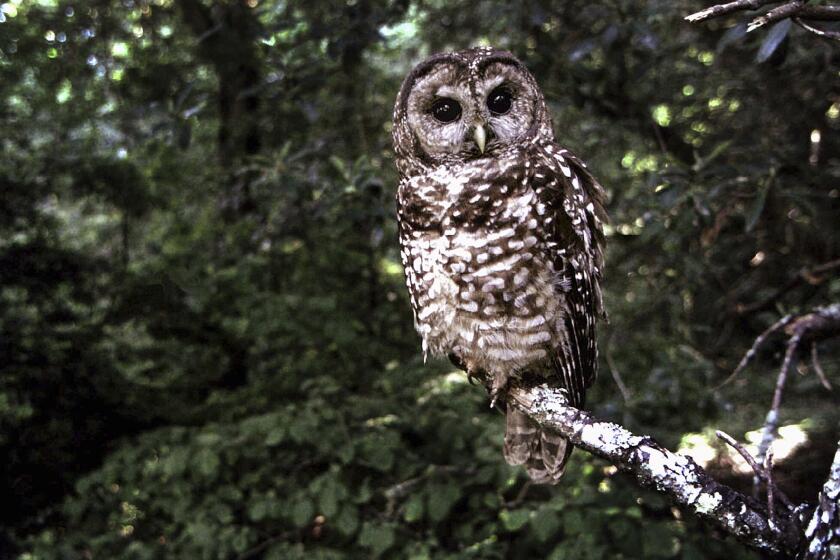Seven Trainers Targeted by Investigators
- Share via
DEL MAR — Seven California trainers soon will be notified by the California Horse Racing Board that they ran horses that tested positive for clenbuterol, a possible performance-enhancing drug that is permitted for training but not during racing.
Without naming the trainers, the racing board said Thursday it would file accusations against the seven, who will then be given a hearing before an administrative law judge. The judge, after determining liability, can recommend suspensions, fines or both to the racing board, which is not bound by the judge’s opinions.
Clenbuterol, which can improve breathing, was illegal in the United States until May 11, when it was approved by the U.S. Food and Drug Administration for horses afflicted with chronic pulmonary diseases.
In California and other states, however, horses are not permitted to race with clenbuterol in their systems, and several positive urine samples outside California have been attributed to horses running too close to the time they received the drug during training. Tests have shown that clenbuterol can remain in a horse’s system for as long as 13 days.
Without expressing their intentions, state racing investigators reportedly conducted barn searches of Southern California trainers Peter Eurton, Darrell Vienna, Bruce Headley, Ted West and Bob Marshall in June and July.
At Del Mar on Thursday, Vienna referred questions about positive clenbuterol results to his attorney, Robert Forgnone. In a telephone interview, Forgnone said he represents several of the trainers facing clenbuterol accusations, but he declined to identify them. Their names will become public once the accusations are issued, which could be within a week, Forgnone said.
In 1992, Vienna and Headley were among four California trainers who raced horses that tested positive for clenbuterol. Then in February 1993, the racing board fired Dennis Hutcheson, its executive secretary, saying he prematurely had dismissed three cases. Vienna said then that his rights had been denied and his reputation unfairly tarnished.
The racing board said Thursday that the seven trainers accounted for 17 positive clenbuterol tests at Hollywood Park, Golden Gate Fields and the Cal-Expo in Sacramento. The horses raced between May 16 and July 11. Most of the races were for thoroughbreds, but the positive results at Cal-Expo involve harness horses.
There were actually 20 preliminary positive tests but one was thrown out when it couldn’t be confirmed by a second laboratory, and testing of two more hasn’t been completed by the second lab. The two outstanding tests are for horses belonging to trainers other than the seven already under fire.
On May 21, 10 days after the federal government’s legalization of clenbuterol, the California Horse Racing Board introduced new laboratory procedures that would detect low levels of the drug in horses’ urine.
Forgnone said, “On the one hand, you have to applaud the board for doing that. But then on the other hand, there was an informational gap. Trainers weren’t told about this new methodology right away. My clients have had positives between May 21 and June 5, when they were unfairly caught in the middle of a change in procedures.”
The Daily Racing Form carried a story about the racing board’s new clenbuterol testing procedures on May 24.
Just a trace of a prohibited drug constitutes a positive result in California. Horsemen familiar with a positive test for one of Vienna’s horses this year said the horse tested for a trillionth of a gram of clenbuterol.
For a clenbuterol positive in Northern California in 1989, trainer Larry Sterling was suspended for six months. Even training with clenbuterol was a federal no-no then. Six trainers--two of thoroughbreds and four of harness horses--recently were suspended for a year after clenbuterol positives turned up in New Jersey. At least four of the suspensions are being appealed.
In Kentucky, trainer Eduardo Caramori was absolved of wrong-doing last month in a clenbuterol case, but his veterinarian, Ruel Cowles II, was suspended for 30 days. The horse, who paid $286.40 to win at Churchill Downs, was disqualified, costing his owner a purse of $20,460.
Cowles, showing the Kentucky Racing Commission an advisory from a Canadian manufacturer of the clenbuterol syrup, said he was told the drug would leave a horse’s system in five days.
“Trainers beware,” said Bob Lewis, the owner of Silver Charm and president of the Thoroughbred Owners of California. “This medication has been approved, but it’s a risky business using it, because it could still show up 13 or 14 days later, and perhaps even longer.”
More to Read
Go beyond the scoreboard
Get the latest on L.A.'s teams in the daily Sports Report newsletter.
You may occasionally receive promotional content from the Los Angeles Times.










